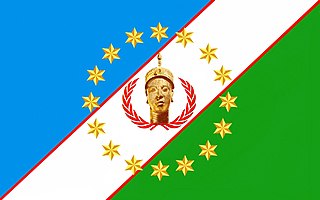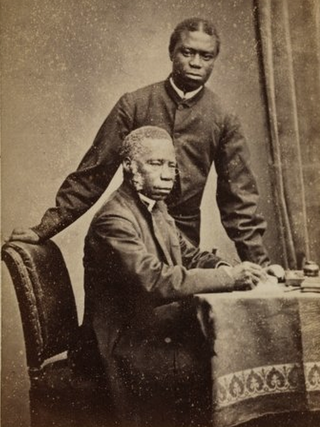
Ifẹ̀ is an ancient Yoruba city in south-western Nigeria. The city is located in present-day Osun State. Ife is about 218 kilometers northeast of Lagos with a population of over 500,000 people, which is the highest in Osun State according to population census of 2006.

Samuel Crowther, was a Yoruba linguist, clergyman, and the first African Anglican bishop of West Africa. Born in Osogun, he and his family were captured by slave raiders when he was about twelve years old. This took place during the Yoruba civil wars, notably the Owu wars of 1821–1829, where his village Osogun was sacked. Ajayi was later on resold to Portuguese slave dealers, where he was put on board to be transported to the New World through the Atlantic.

Chief Daniel Olorunfẹmi Fágúnwà MBE, popularly known as D. O. Fágúnwà, was a Nigerian author of Yorùbá heritage who pioneered the Yorùbá language novel.

The Rev. Samuel Johnson was an Anglican priest and historian of the Yoruba.
Oba Sir Isaac Babalola Akinyele, KBE was the first educated Olubadan of Ibadan, and the second Christian to ascend the throne.
Isaac Oluwole (1852–1932) was a Nigerian bishop of Sierra Leonean and Egba heritage. He was one of the most prominent emigrants from Sierra Leone resident in Lagos during the second half of the nineteenth century. From 1879 to 1893, he was the principal of the CMS Grammar School, Lagos and was later ordained a priest. During his time, he was one of the most loved among his peers of clergymen. A reason which may have led to his recommendation as a bishop after a leading radical candidate, James Johnson, complained about the neglect of indigenous control of the Church of Missionary Society.

The Yoruba people are a West African ethnic group that mainly inhabit parts of Nigeria, Benin, and Togo. The areas of these countries primarily inhabited by the Yoruba are often collectively referred to as Yorubaland. The Yoruba constitute more than 52 million people in Africa, are over a million outside the continent, and bear further representation among members of the African diaspora. The vast majority of the Yoruba population is today within the country of Nigeria, where they make up 21% of the country's population according to CIA estimations, making them one of the largest ethnic groups in Africa. Most Yoruba people speak the Yoruba language, which is the Niger-Congo language with the largest number of native or L1 speakers.
Herbert Tugwell was a colonial Anglican bishop in the late 19th and early 20th centuries. ordained priest the following year;
James "Holy" Johnson was a prominent clergyman and one of the first African members of Nigeria's Legislative Council.
The Ondo Kingdom is a traditional state that traces its origins back for over 500 years, with its capital in Ode Ondo. Ondo Kingdom was established by Princess Pupupu, one the twins of Alafin Oluaso. Her mother was Queen Olu who later died at Ile oluji. The princess gave birth to twins in the era where twins were considered an abomination. They called them Ese Omo. One of the twins died at Epe near Ondo. There were wars in the town between 1865 to 1885 when people in the kingdom fled to Oke Opa. Three Osemawes were installed and died there. Before then the kingdom was ruled by the son of Pupupu called Airo. Airo went to Benin under the pupilage of his uncle Oba Eiseghie 1516 to train in the art of governance.

The CMS Grammar School in Bariga, a suburb of Lagos in Lagos State, is the oldest secondary school in Nigeria, founded on 6 June 1859 by the Church Missionary Society. For decades it was the main source of African clergymen and administrators in the Lagos Colony.

Lagos Colony was a British colonial possession centred on the port of Lagos in what is now southern Nigeria. Lagos was annexed on 6 August 1861 under the threat of force by Commander Beddingfield of HMS Prometheus who was accompanied by the Acting British Consul, William McCoskry. Oba Dosunmu of Lagos resisted the cession for 11 days while facing the threat of violence on Lagos and its people, but capitulated and signed the Lagos Treaty of Cession. Lagos was declared a colony on 5 March 1862. By 1872, Lagos was a cosmopolitan trading center with a population over 60,000. In the aftermath of prolonged wars between the mainland Yoruba states, the colony established a protectorate over most of Yorubaland between 1890 and 1897. The protectorate was incorporated into the new Southern Nigeria Protectorate in February 1906, and Lagos became the capital of the Protectorate of Nigeria in January 1914. Since then, Lagos has grown to become the largest city in West Africa, with an estimated metropolitan population of over 9,000,000 as of 2011.

Thomas King Ekundayo Phillips was a Nigerian organist, conductor, composer and teacher who has been described as the "father of Nigerian church music"
The Ecclesiastical Province of Lagos is one of the 14 ecclesiastical provinces of the Church of Nigeria. It comprises 13 dioceses:

Oba Adeyeye Enitan Ogunwusi; is the 51st and current Ooni of Ife. He is the traditional ruler/monarch of the Yoruba kingdom of Ile-Ife. He ascended to the throne of his forebearers in 2015 succeeding the deceased Oba Okunade Sijuwade who was the 50th Ooni of Ife.

Dandeson Coates Crowther was Archdeacon of The Niger from 1876 until 1926.
Josiah Jesse "J.J." Ransome-Kuti was a Nigerian clergyman and music composer. He was known for setting Christian hymns to indigenous music, and for writing Christian hymns in Yoruba.
The Anglican Diocese of Ife is one of 17 within the Anglican Province of Ibadan, itself one of 14 provinces within the Church of Nigeria. The current bishop is Olubunmi Akinlade.
The Anglican Diocese of Lagos is one of 13 dioceses within the Anglican Province of Lagos, itself one of 14 provinces within the Church of Nigeria. The current bishop is Humphrey Bamisebi Olumakaiye who succeeded Ephraim Ademowo.











